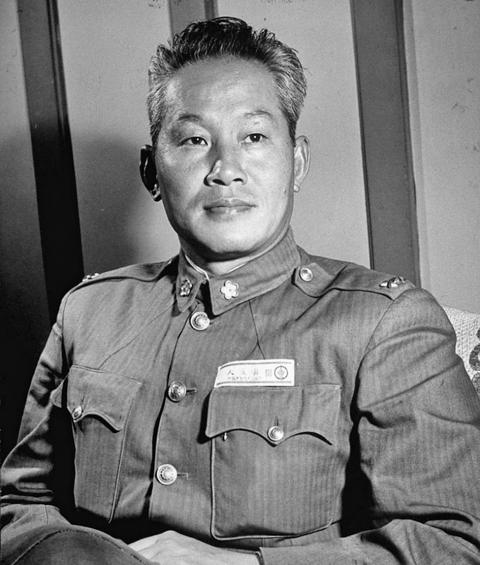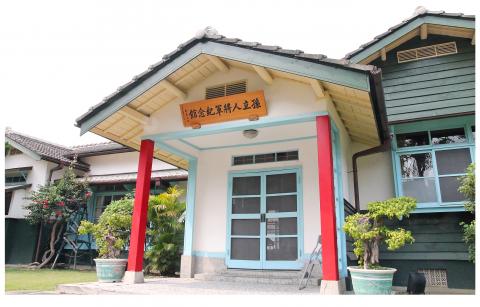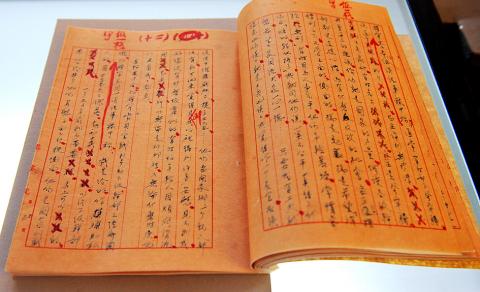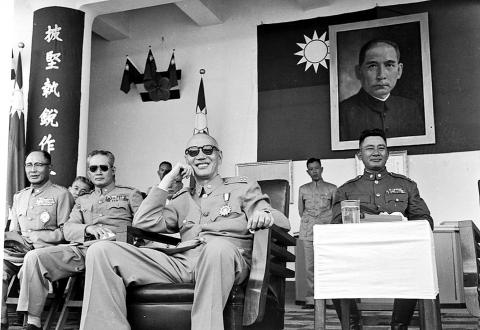Nov. 13 to Nov. 19
Sun Li-jen (孫立人) stayed silent for 33 years. The only reminders of his existence were occasional reports such as “Sun Li-jen is still alive!” which appeared in Xinwen Tiandi (新聞天地) magazine in 1982.
A famed general who led the “Best Army Under Heaven” during the Chinese Nationalist Party’s (KMT) campaigns against the Japanese and the Chinese communists, Sun was placed under house arrest in 1955 by KMT leader Chiang Kai-shek (蔣介石) after he was charged with trying to start a coup.

Photo courtesy of Wikimedia Commons
Chiang’s son, Chiang Ching-kuo (蔣經國), continued Sun’s imprisonment when he became president. Less then two months after the younger Chiang’s death in January 1988, Sun’s family contacted journalist Lee Wen-pang (李文邦), who spoke with Sun for three hours, publishing an exclusive interview in the Independent Evening Post (自立晚報) and a feature piece in The Journalist (新新聞) magazine.
Sun, who was 87 years old by then, asked his foster son to show Lee a page of his notebook, which read: “Who can clear my name? Who can give me justice?” He would later note that he no longer remembered when he scribbled those characters.
Sun expressed regret that his numerous subordinates were also punished, and said that he hoped the government would clear his name before he died. But his wife and son were not confident that it would happen, noting that the files of the case were classified and that all efforts up to that point had failed.

Photo: CNA
Just a few months later, he was released on then-president Lee Teng-hui’s (李登輝) orders. Sun had earlier told Lee Wen-pang that he wanted to clear his name more than he wanted freedom, but he died on Nov. 19, 1990 — 10 years too early for his exoneration by the Control Yuan.
DUAL REPORTS
Former Control Yuan member Tao Pai-chuan (陶百川) wrote in his 1982 memoir, “Out of all the cases where I tried to clear someone’s name, none required more courage than the [Sun Li-jen case].”

Photo: Chang Chia-ming, Taipei Times
Tao was part of a five-person committee formed by the Control Yuan in 1955 to conduct an independent investigation after Chiang’s nine-person committee found Sun guilty of all charges.
Government Information Office Minister Wu Nan-ju (吳南如), the then-minister of the now-defunct Government Information Office, presented the official version of events in a public statement after the incident.
“The mastermind of the recent spying case, Kuo Ting-liang (郭廷亮) is Sun Li-jen’s long-time subordinate. Kuo was sent to Taiwan to use his relationship with Sun to infiltrate and overthrow the government … Kuo plans of a coup were discovered by the authorities, and he has confessed to his deeds. Sun blames himself for not noticing this and has since resigned from his post. The President has launched a committee to fairly investigate the case.”

Photo: CNA
Chiang’s committee was comprised of government top dogs, including Vice President Chen Cheng, (陳誠), Minister of Justice Wang Chung-hui (王寵惠), Minister of Defense Yu Ta-wei (俞大維) and Secretary General to the President Chang Chun (張群).
The report began with Sun’s resignation letter, in which he deeply regrets his negligence that almost destroyed the country, “a crime that cannot be redeemed with 100 lives.”
The nine men found Sun not only guilty of negligence, but also claimed that Sun had asked Kuo to help him recruit and organize a secret army, and that Kuo used this opportunity, along with the funds provided by Sun, to continue his rebellious activities. The report’s findings conclude that Sun must have known about his subordinate’s plans and accused him of harboring communists.
The report produced by the five-person committee never saw the light of day until it was declassified in 2001. In it, committee members state that they launched the investigation after noticing something fishy about Kuo’s confession. But they were only allowed to speak to Sun and not Kuo, of which they questioned the legality in the report.
After reviewing the confessions, the committee concluded that Kuo’s activities did not constitute sedition and that he and Sun were only trying to come up with a plan to improve the army. It also maintains that Sun did not know about his subordinate’s rebellious intent and that his resignation would be sufficient punishment.
Committee member Tsao Chi-wen (曹啟文) continued to fight for Sun’s innocence in the next few years, proclaiming at a government forum in 1956 that Lee was tortured and that the whole case was fabricated because of a personal conflict.
FORTY-SIX YEARS LATER
Chu Hung-yuan’s (朱浤源) 26-year odyssey to clear Sun’s name began when he entered the general’s house in Taichung in April 1988. Over the years, the Academia Sinica historian would interview more than 100 people related to the case.
Chu writes in an Academia Sinica Weekly article that the investigation took so long for many reasons, including Sun’s death after the 13th interview. Things became even more complicated after former US Secretary of State Dean Rusk told the China Times (中國時報) that Sun was indeed planning a coup.
Kuo, who had been confined by the government to Green Island after he was released from prison, mysteriously died after his first interview with Chu in 1991, apparently falling off a train car in Chungli. This only fueled Chu’s fire to find the truth.
The breakthrough came when Chu found the disappeared five-person committee report, although it had been heavily censored. He also got hold of Kuo’s medical records, concluding that Kuo was attacked on the train and thrown off.
Chu also found that Kuo was not a communist spy, although he may have been planning to use force to influence government policy. Chu also found it strange that while sedition carries a death sentence, Chiang changed the sentence to life imprisonment. Through interviews with former members of the Taiwan Garrison Command, Chu found that the government provided for the Kuo family and left him alone as long as he stayed on Green Island and kept silent.
Since Kuo’s confession was central to the case, Chu concluded that the entire case was invalid. Sun’s innocence was approved by the Control Yuan in 2001.
Chu continued to interview people afterward, and in 2012 he announced that Kuo was tricked into confessing after being told that doing so would save Sun. Kuo’s role may have been clear, but Sun’s is murkier as it was later found that the US favored him over Chiang and would have supported him if he launched a coup — at least until the Korean War broke out. But other sources maintain that he simply ran afoul of Chiang Ching-kuo as the two clashed in military ideology.
Nevertheless, he was considered a thorn in the side to the Chiang regime, which sealed his fate.
Taiwan in Time, a column about Taiwan’s history that is published every Sunday, spotlights important or interesting events around the nation that have anniversaries this week.

This month the government ordered a one-year block of Xiaohongshu (小紅書) or Rednote, a Chinese social media platform with more than 3 million users in Taiwan. The government pointed to widespread fraud activity on the platform, along with cybersecurity failures. Officials said that they had reached out to the company and asked it to change. However, they received no response. The pro-China parties, the Chinese Nationalist Party (KMT) and Taiwan People’s Party (TPP), immediately swung into action, denouncing the ban as an attack on free speech. This “free speech” claim was then echoed by the People’s Republic of China (PRC),

Exceptions to the rule are sometimes revealing. For a brief few years, there was an emerging ideological split between the Democratic Progressive Party (DPP) and Chinese Nationalist Party (KMT) that appeared to be pushing the DPP in a direction that would be considered more liberal, and the KMT more conservative. In the previous column, “The KMT-DPP’s bureaucrat-led developmental state” (Dec. 11, page 12), we examined how Taiwan’s democratic system developed, and how both the two main parties largely accepted a similar consensus on how Taiwan should be run domestically and did not split along the left-right lines more familiar in

Specialty sandwiches loaded with the contents of an entire charcuterie board, overflowing with sauces, creams and all manner of creative add-ons, is perhaps one of the biggest global food trends of this year. From London to New York, lines form down the block for mortadella, burrata, pistachio and more stuffed between slices of fresh sourdough, rye or focaccia. To try the trend in Taipei, Munchies Mafia is for sure the spot — could this be the best sandwich in town? Carlos from Spain and Sergio from Mexico opened this spot just seven months ago. The two met working in the

Many people in Taiwan first learned about universal basic income (UBI) — the idea that the government should provide regular, no-strings-attached payments to each citizen — in 2019. While seeking the Democratic nomination for the 2020 US presidential election, Andrew Yang, a politician of Taiwanese descent, said that, if elected, he’d institute a UBI of US$1,000 per month to “get the economic boot off of people’s throats, allowing them to lift their heads up, breathe, and get excited for the future.” His campaign petered out, but the concept of UBI hasn’t gone away. Throughout the industrialized world, there are fears that